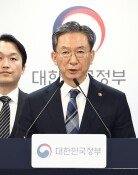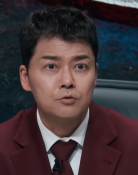Presidential Secretary: Systemic Change Delays Economic Recovery
Presidential Secretary: Systemic Change Delays Economic Recovery
Posted August. 22, 2005 03:11,
Kim Byung-jun, the presidential secretary for national policy, stated on August 21, The biggest achievement of the incumbent administration during the first half of its duration has been eliminating the problematic practices in elections and the collusive ties between politicians and businessmen, and recovering the legitimacy of government control by shifting government-controlled institutions into those of the people.
He cited the area still requiring the most work as regional division, though it takes more than the government alone to address this, and noted, The agenda-setting process is not properly carried out in Korea due to regional conflicts and political malpractices generated from a divisive environment, and this is another crisis.
Kim held a press conference at Chunchugwan of Cheong Wa Dae on the same day and assessed the situation, saying, Two and a half years ago, when this administration came into office, there were many mind-boggling issues such as credit delinquency and the North Korean nuclear standoff, and quite a few were unwilling to accept the results of the presidential election.
In regard to the poor economic score, he explained, The economy is slow to recover because we have focused on overhauling the structure and system instead of taking stopgap measures. He added, I feel so bad and depressed whenever I hear words such as, what has changed, the economy is at a standstill and youth unemployment is not improving, there are no tangible results, etc.
In response to the low approval ratings, he stressed, It is not easy to tackle structural and long term issues when the government is obsessed with increasing short term support. While keeping a close eye on why people are suffering, we will not take temporary measures solely to gain approval ratings.
However, he said, The worlds leading credit rating institute, Standard and Poors, has upgraded the sovereign rating of Korea from A- to A, and the ranking of the national competitiveness index released by Switzerland-based Institute for Management and Development (IMD) has jumped from last years 35th to 29th. This proves the governments effort to identify the cause of problems and extend fundamental treatment.
Regarding the underlying governance principle of the second half of the current term, he said, As with the past two and a half years, we will focus on long term and structural issues, which include: regional prejudices which greatly distort agenda-setting and decision making, party system based on such an environment, economic slump and polarization that causes conflicts between classes, low fertility rate, and aging, among others.
Kim added, There is no perfect government. Anyone can make mistakes. But I hope partial problems are not exaggerated to overshadow the remaining positive sides. Excessive criticism, misconception, and generalizing unreasonable estimates will benefit no one.
Jung-Hun Kim jnghn@donga.com







